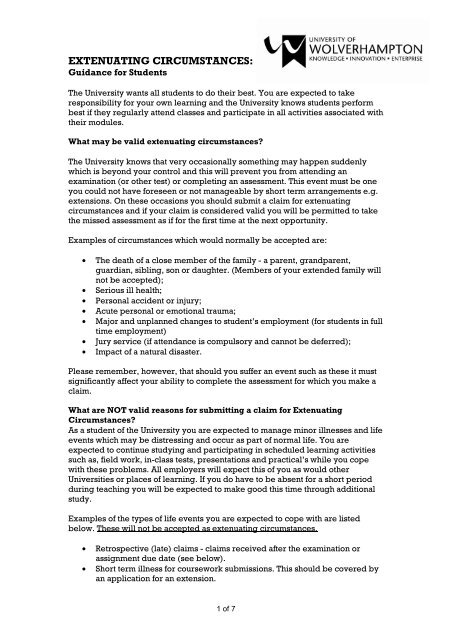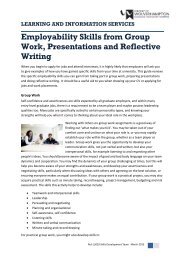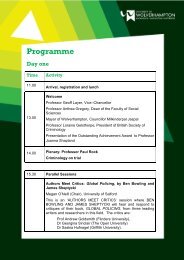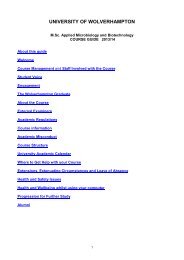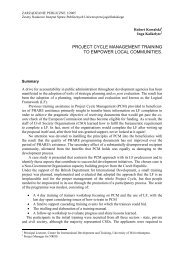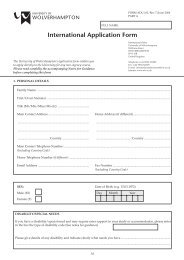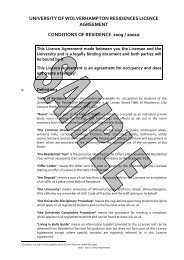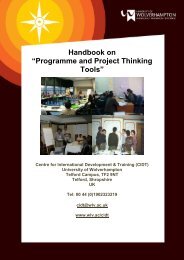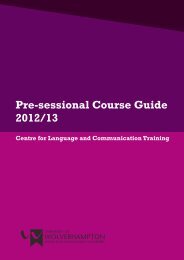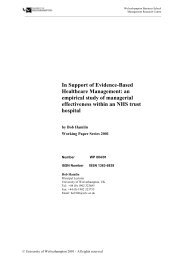Extenuating Circumstances Guidance for Students 2011v5
Extenuating Circumstances Guidance for Students 2011v5
Extenuating Circumstances Guidance for Students 2011v5
You also want an ePaper? Increase the reach of your titles
YUMPU automatically turns print PDFs into web optimized ePapers that Google loves.
EXTENUATING CIRCUMSTANCES:<br />
<strong>Guidance</strong> <strong>for</strong> <strong>Students</strong><br />
The University wants all students to do their best. You are expected to take<br />
responsibility <strong>for</strong> your own learning and the University knows students per<strong>for</strong>m<br />
best if they regularly attend classes and participate in all activities associated with<br />
their modules.<br />
What may be valid extenuating circumstances?<br />
The University knows that very occasionally something may happen suddenly<br />
which is beyond your control and this will prevent you from attending an<br />
examination (or other test) or completing an assessment. This event must be one<br />
you could not have <strong>for</strong>eseen or not manageable by short term arrangements e.g.<br />
extensions. On these occasions you should submit a claim <strong>for</strong> extenuating<br />
circumstances and if your claim is considered valid you will be permitted to take<br />
the missed assessment as if <strong>for</strong> the first time at the next opportunity.<br />
Examples of circumstances which would normally be accepted are:<br />
• The death of a close member of the family - a parent, grandparent,<br />
guardian, sibling, son or daughter. (Members of your extended family will<br />
not be accepted);<br />
• Serious ill health;<br />
• Personal accident or injury;<br />
• Acute personal or emotional trauma;<br />
• Major and unplanned changes to student’s employment (<strong>for</strong> students in full<br />
time employment)<br />
• Jury service (if attendance is compulsory and cannot be deferred);<br />
• Impact of a natural disaster.<br />
Please remember, however, that should you suffer an event such as these it must<br />
significantly affect your ability to complete the assessment <strong>for</strong> which you make a<br />
claim.<br />
What are NOT valid reasons <strong>for</strong> submitting a claim <strong>for</strong> <strong>Extenuating</strong><br />
<strong>Circumstances</strong>?<br />
As a student of the University you are expected to manage minor illnesses and life<br />
events which may be distressing and occur as part of normal life. You are<br />
expected to continue studying and participating in scheduled learning activities<br />
such as, field work, in-class tests, presentations and practical’s while you cope<br />
with these problems. All employers will expect this of you as would other<br />
Universities or places of learning. If you do have to be absent <strong>for</strong> a short period<br />
during teaching you will be expected to make good this time through additional<br />
study.<br />
Examples of the types of life events you are expected to cope with are listed<br />
below. These will not be accepted as extenuating circumstances.<br />
• Retrospective (late) claims - claims received after the examination or<br />
assignment due date (see below).<br />
• Short term illness <strong>for</strong> coursework submissions. This should be covered by<br />
an application <strong>for</strong> an extension.<br />
1 of 7
• Examination stress or anxiety during revision and assessment periods;<br />
• Domestic or personal disruptions such as, moving house, a change of job,<br />
weddings, religious festivals, failed travel arrangements, financial<br />
difficulties;<br />
• Study related problems such as, equipment failure, failure to back up<br />
copies of stolen or corrupted work;<br />
• Disabilities and medical conditions known to you when you accept a place<br />
to study at University and <strong>for</strong> which special arrangements or adaptations<br />
have been made. However, exceptionally the University may consider a<br />
sudden and unexpected worsening of a condition known to you <strong>for</strong><br />
example; fluctuating or intermittent medical conditions i.e. Multiple<br />
Sclerosis (MS); Myalgic Encephalomyelitis (ME) ; Rheumatoid Arthritis,<br />
Parkinson’s Disease, Chrohn’s Disease, Diabetes, Sickle Cell Anaemia,<br />
mental illness, acute stress. Conditions such as these will only be<br />
considered if you are registered with the Student Enabling Centre and<br />
have provided medical evidence to confirm your condition. For further<br />
advice and assistance please consult specialist staff who work in the<br />
Student Enabling Centre<br />
• The absence of a member of your team when your assignment is group<br />
work, subject to the nature of the group work. Please consult your module<br />
leader if a group member is absent <strong>for</strong> an extended period.<br />
• The death of a member of your extended family, e.g. an uncle or aunt.<br />
• Employment-related issues (except <strong>for</strong> students in full time employment<br />
normally studying on a part time course )<br />
• Pregnancy - Claims <strong>for</strong> pregnancy will not normally be accepted. You<br />
should determine whether you believe that you will be fit to study and<br />
undertake assessment around your birth date. If you wish to defer study<br />
then you should apply <strong>for</strong> a 'Leave of Absence' <strong>for</strong> the Semester that<br />
you are due to give birth. However any unexpected difficulties around the<br />
birth date would be considered but must be supported by evidence.<br />
• Redundancy or Threat of redundancy - applicable to students in full time<br />
employment only. Claims will only be accepted if the redundancy/threat<br />
of redundancy has occurred within one month of the assessment due date.<br />
For longer periods, these claims must be supported by a medical note or<br />
evidence of financial hardship'<br />
How and when should you make a claim?<br />
You should treat a claim <strong>for</strong> extenuating circumstances in the same manner as if<br />
you were notifying your employer of any absences. You must submit your claim<br />
when you experience difficulties. Do not delay. Retrospective (late) claims will<br />
not be accepted. Your claim must be made be<strong>for</strong>e or on the day of your<br />
examination or your assignment is due.<br />
Log into e:Vision. Go to your ‘My Assignments page and <strong>Extenuating</strong><br />
<strong>Circumstances</strong>’ page.<br />
Click into the relevant assessment that you are applying <strong>for</strong> <strong>Extenuating</strong><br />
<strong>Circumstances</strong> <strong>for</strong>. If you are applying <strong>for</strong> more than one assessment then you will<br />
need to apply separately <strong>for</strong> each module. Please note that if the link is not<br />
available, then it indicates that you are now too late to apply <strong>for</strong> <strong>Extenuating</strong><br />
<strong>Circumstances</strong>.<br />
Follow the stages on the e:Vision screens<br />
2 of 7
Submit the original, independent, supporting evidence at your Student Office as<br />
soon as possible and within 5 working days.<br />
Claims will be considered within 5 working days from when the Student Office<br />
receives your supporting evidence.<br />
A claim must be made <strong>for</strong> each period of assessment within the academic year,<br />
e.g. a claim made and accepted <strong>for</strong> June will not cover the July retrieval period. A<br />
new claim must be submitted. However, please be aware that the University will<br />
not normally accept a second claim if the difficulties you state have affected your<br />
per<strong>for</strong>mance are the same as the first. (except if it is because of one of the<br />
disabilities mentioned above.)<br />
You are expected to make use of the leave of absence process if your studies are<br />
interrupted <strong>for</strong> a lengthy period. Further more you should seek the advice of<br />
Student Enabling Centre staff, which may be able to offer you support to cope<br />
with a condition which persists.<br />
What evidence should be provided?<br />
You must submit with your claim receipt, original independent supporting<br />
evidence. Examples include:<br />
Death certificates - if there has been a death in your immediate family you must<br />
attach a verified copy of the death certificate.<br />
Medical notes - if you have been ill the evidence you must provide is a doctor’s<br />
medical certificate. The certificate must state clearly the dates and duration of<br />
your illness and provide a clear diagnosis. The University will NOT accept a<br />
certificate in which the doctor reports that you said that you were ill. If the date of<br />
your medical note differs significantly from the dates cited on the note, then your<br />
claim will be rejected.<br />
Please note that it is the student’s responsibility to obtain a medical note. The<br />
University will not contact your Doctor on your behalf.<br />
A police crime report detailing the incident, a Crime Reference Number by itself<br />
will not suffice.<br />
Letter from your employer; only students in full time employment, may claim <strong>for</strong><br />
exceptional changes to work patterns. If you consider it necessary to claim <strong>for</strong> this<br />
you must provide signed correspondence from your employer confirming this<br />
commitment and the duration and that the work could not have been undertaken<br />
by anyone else.<br />
You may feel that your circumstances are sensitive and not wish to type them on<br />
the <strong>for</strong>m. If this is the case you must seek counselling. This could be a professional<br />
University counsellor, a member of staff employed by the counselling service or a<br />
counselling professional independent of the University. If the counsellor<br />
considers your circumstances valid s/he will write a supporting statement <strong>for</strong> you<br />
to use as evidence. You must be known to the counselling service <strong>for</strong> it to be able<br />
to support your claim. If you are not, staff will be able to advise you on services<br />
which can provide independent evidence. Academic staff and your personal tutor<br />
are not considered to be independent.<br />
3 of 7
Please note that you must still apply online <strong>for</strong> each assessment be<strong>for</strong>e the<br />
assessment submission date. In the circumstances outlined in the paragraph<br />
above, you are not required to disclose your reason <strong>for</strong> claiming <strong>Extenuating</strong><br />
<strong>Circumstances</strong>. Instead, you should state that you have sought counselling and<br />
will be submitting a supporting statement along with your evidence.<br />
You may also be asked to submit the work you have already completed so that<br />
your claim can be assessed fairly.<br />
Please take care in ensuring that you provide all necessary in<strong>for</strong>mation when<br />
completing the stages of the e:Vision screens and when submitting evidence to<br />
your Student Office. If any stages are not completed you will be unable to submit<br />
your claim on e:Vision.<br />
Will I get the original documents provided to support my claim returned to<br />
me?<br />
Yes, on request. If you are handing in the evidence at a Student Office and wish to<br />
receive the original documentation back, please ask the Student Office Assistant<br />
to photocopy the documentation and verify the copy stating that they have seen<br />
the original.<br />
If you are posting in the documentation, then these will be retained <strong>for</strong> you and<br />
can be collected from the Student Office on your next visit. If you are not able to<br />
visit the Student Office be<strong>for</strong>e needing the documentation back then these can be<br />
posted back to you by the same method as you have posted it to us. However you<br />
must state in a covering letter that you wish to have the original documentation<br />
returned to you in this way. Please note the University cannot be held responsible<br />
<strong>for</strong> documents lost in the post.<br />
What should I do if I have a minor, short term illness?<br />
For coursework assignments/groupwork only - Minor and short term illnesses eg<br />
coughs, colds, headaches, stomach upsets will not be covered by the <strong>Extenuating</strong><br />
<strong>Circumstances</strong> process – extension requests should be made instead.<br />
The maximum extension permitted is 7 calendar days from the original due date.<br />
Your request <strong>for</strong> an extension must be made be<strong>for</strong>e your assignment deadline<br />
and you may be required to attach to your request the work you have completed<br />
so far. This will be used to assess your request. Remember that you should plan<br />
your work and should have completed most of it well be<strong>for</strong>e the submission<br />
deadline.<br />
For examinations, in-class tests and practicals (e.g. one-off timetabled events<br />
requiring your attendance) – please follow the process outlined above under<br />
‘How and when to make your claim?’<br />
What should I do if I have a long term illness or personal difficulties?<br />
The University has a number of services to support students. These include the<br />
following:<br />
4 of 7
School-based services e.g. Special Needs Tutor, Personal Tutor<br />
Student ‘here2help’ Offices<br />
Counselling Services<br />
Student Enabling Centre<br />
Student Gateway<br />
<strong>Students</strong>’ Union – Advice and Support Centre<br />
If your illness or situation is likely to be ongoing, please speak with your disability<br />
adviser or your personal tutor as soon as possible so that you can be reassessed.<br />
You may also need to speak with your academic counsellor who may, depending<br />
on your condition recommend that you take a leave of absence as your condition<br />
could affect your ability and per<strong>for</strong>mance on the course.<br />
On return from your leave of absence you may need to provide the Student<br />
Enabling Centre or Personal Tutor with evidence that you are well enough to<br />
study. It is possible that your support may need to be reassessed to ensure that<br />
appropriate arrangements are in place to support you throughout your course.<br />
You are allowed to request a leave of absence which lasts a maximum of four<br />
semesters, unless professional body requirements which govern your course<br />
prohibit this. It is always advisable to speak to staff in your Student Office be<strong>for</strong>e<br />
you request a leave of absence. Staff in your Office will be able to explain the<br />
financial implications of a leave of absence.<br />
If you are an overseas student and consider it better to return to home <strong>for</strong><br />
treatment please go to the International Office <strong>for</strong> advice be<strong>for</strong>e you leave<br />
Wolverhampton. The UK Border Agency will need to be in<strong>for</strong>med of your absence<br />
and the reason <strong>for</strong> it.<br />
What happens after I have submitted my extenuating circumstances claim<br />
on e:Vision and submitted evidence to the Student Office?<br />
Your claim will be considered by your Student Office Manager. Student Office<br />
Managers will work as a team to ensure that they apply the same criteria in<br />
determining the outcome of a claim. They will let you know the outcome of your<br />
claim by e-mail. The decision will also be available on your ‘My Assignments and<br />
<strong>Extenuating</strong> <strong>Circumstances</strong>’ page in e:Vision within five working days.<br />
What will be the outcome of a claim?<br />
If your claim is accepted you will be permitted to submit assessment at the next<br />
opportunity within the current academic year. The work you submit then will be<br />
graded and you will receive the true grade. If you do not then pass this reassessment<br />
you will still have a further right of resit at the next opportunity.<br />
If your claim is rejected you will receive an NS or 0NS <strong>for</strong> the work not submitted.<br />
You will receive brief in<strong>for</strong>mation on why your claim was rejected.<br />
If there is a delay in the assessment of your claim you should still prepare and<br />
submit assessment at the next opportunity within the academic year. Do not wait<br />
<strong>for</strong> the outcome of the claim be<strong>for</strong>e you begin preparing work or submit<br />
assessment.<br />
What Will Happen If My Claim Is Successful?<br />
5 of 7
If your claim is successful and you have not submitted the relevant work, or you<br />
have submitted the relevant work but not passed it, you will normally be offered<br />
the opportunity to sit the assessment, as if <strong>for</strong> the first time. This must be within the<br />
current academic year.<br />
The next available opportunity should be given in your module guide, but it will<br />
normally be within the same academic year unless, <strong>for</strong> example, it relates to<br />
placement-based assessment that needs to be rolled over to the next year. If in<br />
doubt please look on WOLF or contact the module leader, who will be able to<br />
confirm when the next opportunity is.<br />
If you don't take the assessment at the next opportunity, your assessment will<br />
become subject to the rules of re-sits (i.e. your next attempt will be capped at<br />
grade D/D5).<br />
What happens if my claim is rejected?<br />
You will be given the reason(s) why your claim has been unsuccessful. You will<br />
have to re-sit or retake the relevant assessment as normal, providing you are<br />
within your registration period (please refer to the University regulations if you<br />
are not sure of this period). If you pass it on resit the maximum grade you will get<br />
<strong>for</strong> that assessment is a D/D5.<br />
If, having read the reasons <strong>for</strong> rejection, you wish to appeal, you must justify why<br />
you are making this appeal in writing and submit it to your Student Office<br />
Manager along with any additional evidence, if available. Please do this promptly<br />
and within two calendar weeks of the publication of the original decision. Your<br />
claim will be reconsidered by the Student Office Manager and where appropriate<br />
passed to the University <strong>Extenuating</strong> <strong>Circumstances</strong> Committee.<br />
You can appeal if:<br />
1) You believe that these guidelines have not been followed.<br />
2) These guidelines do not cover your particular circumstances.<br />
You cannot appeal if:<br />
1) These guidelines have been followed but you do not agree with the<br />
decision<br />
2) Your claim was submitted after the assessment deadline<br />
If the <strong>Extenuating</strong> <strong>Circumstances</strong> Committee also rejects your claim you can<br />
appeal against this decision to the Conduct and Appeals Unit, within three months<br />
of the publication of the decision. Once again you must justify why you believe<br />
you still have a valid claim after you have considered all guidance published to<br />
students and the reasons the Committee did not accept your claim.<br />
What If My <strong>Extenuating</strong> <strong>Circumstances</strong> Relate To Re-Sits?<br />
If you have valid extenuating circumstances that relate to re-assessment (your<br />
second attempt), you will normally be given the chance to take the re-sit again at<br />
the next available opportunity. The grade <strong>for</strong> this assessment will still be capped<br />
at D/D5, as is normal <strong>for</strong> re-sits.<br />
6 of 7
If you don't take the re-assessment at the next available opportunity, you will<br />
receive grade 0NS <strong>for</strong> the assessment. your overall module grade will then be<br />
given a retake status, requiring you to retake the whole module, including<br />
attending the lectures and retaking ALL the assessment. Your module grade will<br />
be capped to a D/D5 upon retake. You could also be charged a retake fee <strong>for</strong> this.<br />
Do The Normal Rules Of Compensation Apply To <strong>Extenuating</strong><br />
<strong>Circumstances</strong>?<br />
No, you will not be compensated if you submit your assessment with valid<br />
extenuating circumstances and you receive an overall module grade of E4. You<br />
will be given chance to take the relevant assessment again, as if <strong>for</strong> the first time,<br />
at the next available opportunity. (Note that Postgraduate students are not entitled<br />
to have final grades compensated)<br />
What If I Submit My Assessment And Pass It With Grade D Or Above?<br />
If you did submit work and passed your assessment you may submit the<br />
assessment <strong>for</strong> a second time to improve your grade. You must register your<br />
intention to submit the assessment again within 14 days of the publication of your<br />
results. If you register your intention, however, and the grade you get <strong>for</strong> the<br />
second attempt is lower than the first (including an 0NS <strong>for</strong> non submission) this<br />
will be the grade awarded <strong>for</strong> the assessment. (Note, this doesn’t apply to<br />
Postgraduate students) You must register your intention via the E-Vision<br />
Helpdesk.<br />
DOCUMENT CONTROL:<br />
VERSION: 5.0 JULY 2011 AUTHOR(s): REGISTRY<br />
APPROVED<br />
DATE:<br />
REVISION<br />
DATE:<br />
July 2011 APPROVED BY: <strong>Extenuating</strong><br />
<strong>Circumstances</strong><br />
Committee.<br />
July 2012<br />
7 of 7


